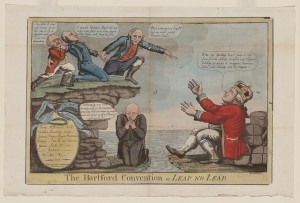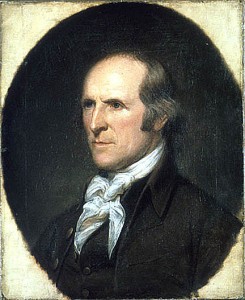Richmond Newspaper Opposed to Secession – in 1814
From The New-York Times May 15, 1861:
Virginia on Secession in 1814.
In 1814, the New-England people became dissatisfied with the conduct of public affairs, and in the celebrated Hartford Convention they took action which looked like asserting the right of secession. Whereupon the Richmond Enquirer, Nov. 1, 1814, said:
“No man, no association of men, no State nor set of States has a right to withdraw itself from this Union, of its own accord. The same power which knit us together can only unknit. The same formality which forged the links of the Union is necessary to dissolve it. The majority of States which form the Union must consent to the withdrawal of any one branch of it. Until that consent has been obtained, any attempt to dissolve the Union, or obstruct the efficiency of its constitutional laws, is treason-treason to all intents and purposes. Any other doctrine, such as that which has been lately held forth by the Federal Republican, that any one State may withdraw itself from the Union, is an abominable heresy — which strips its author of every possible pretension to the name or character of a Federalist.

Pickering prays for secession while Mass leads RI and Conn over the edge (LOC - LC-DIG-ppmsca-10755)
We call, therefore, upon the Government of the Union to exert its energies when the season shall demand it, and seize the first traitor who shall spring out of the hot-bed of the Convention of Hartford. This illustrious Union, which has been cemented by the blood of our forefathers, the pride of America, and the wonder of the world, must not be tamely sacrificed to the heated brains or the aspiring hearts of a few malcontents. The Union must be saved when any one shall dare to assail it.
Countrymen of the East! we call upon you to keep a vigilant eye upon those wretched men who would plunge us into civil war and inevitable disgrace. Whatever, may be the temporary calamities which may assail us, let us swear upon the altar of our country to save the Union.”
This is just as good doctrine now as it was fifty years ago. The Enquirer, which uttered it, is now the leader of the rebellion which it then so justly and so forcibly denounced. But the result will show that the people stand by the Union now as they did when it was assailed by quasi treason in New-England.
Nice argument against disunion. The “the heated brains or the aspiring hearts of a few malcontents” reminds me of the fire-eaters of forty-plus years later.
Timothy Pickering was a Federalist who served as Secretary of State from 1795-1800. At the time of the Hartford Convention (which did not specifically call for secession) he was serving as a Representative from Massachusetts in the U.S. House. Pickering was a member of Essex Junto, which supported New England’s secession.
The Library of Congress describes the political cartoon in detail.


Well spotted. I am beginning to understand the meaning of the union in a time when the hegemony of the United States as a world power was barely a gleam in its collective eye. We tend to take for granted how significant the United States was as an experiment in rational government, free from the shackles of aristocracy and church.